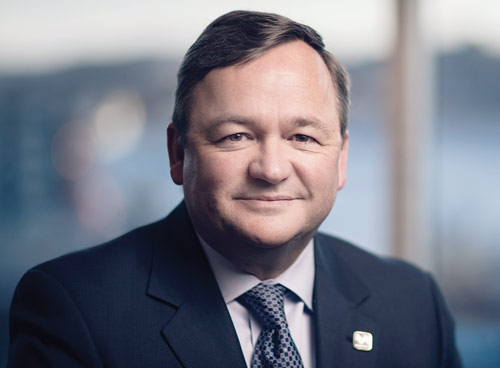Ten utility franchises across North America
Barry Perry is President and CEO of Fortis.
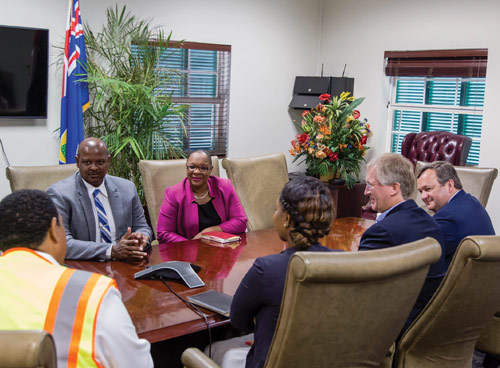
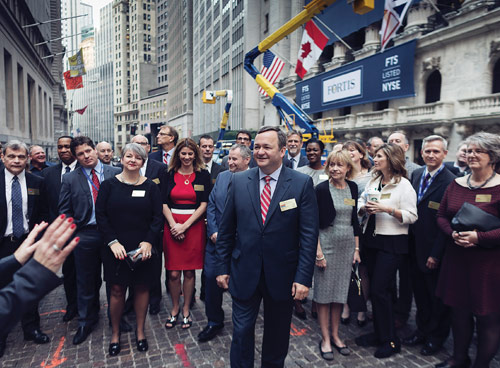
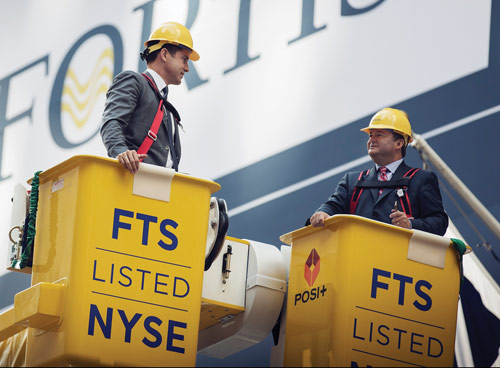
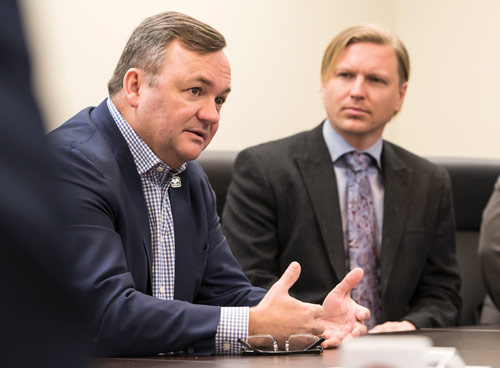
PUF's Steve Mitnick: What's the Fortis story?
Barry Perry: Fortis is based in St. John's, Newfoundland and Labrador and owns utilities across Canada and in the United States - in Arizona with UNS Energy, the Midwest with our ITC transmission company, and New York with Central Hudson Gas and Electric. We also have utilities in the Caribbean.
Fortis was created more than thirty years ago out of a company called Newfoundland Power. Newfoundland Power and its predecessors have been in the utility business in Newfoundland since 1885. We've always been an investor-owned utility business.
Fortis, like many utility holding companies in our sector, was created to diversify the business.
We initially started expanding across Canada. We bought the utility system in Prince Edward Island, and subsequently bought interests in the Caribbean. Then we purchased small utilities in Ontario, like Cornwall Electric and Canadian Niagara Power.
Our first large transaction was the purchase of our western Canadian utilities, the electric businesses in Alberta and British Columbia. We now call them Fortis Alberta and Fortis BC. These businesses were owned back then by Kansas-based Aquila.
PUF: How did the company grow from there?
Barry Perry: Stan Marshall was the CEO of Fortis at the time. He felt that those western Canadian assets were critical for Fortis to obtain. There were not a lot of investor-owned businesses in Canada, but he felt these two were jewels.
Many of the utility systems in Canada are owned by municipalities, cities or provincial governments and are not available for sale. That said, these two investor-owned western utilities were very attractive to Fortis. We competed for that business back in 2003 and won the auction process.
It was a billion-and-a-half-dollar deal at the time. We paid about a half-billion-dollar premium in that transaction which many market commentators thought was expensive. Yet, it's probably the cheapest utility ever bought in North America given that these businesses grew so quickly post our acquisition, especially in Alberta.
We participated in all that economic boom that occurred in Alberta back in the day, in the oil and gas sector, and the in-migration of folks from all across Canada. We added customers and improved the distribution grid.
We had - for many years - double-digit growth in our Alberta business. Overall the purchase of our western electric utility business was almost a company maker for Fortis. It gave us more market attention. We were growing quickly and had marched across the country. Then we started saying, what do we do next?
PUF: What did you do next?
Barry Perry: The logical move was down to the U.S. We were sitting there in 2004, 2005, saying, everything's going really well. We can do this again. We can go buy another company.
So, we started spending a lot of time in the U.S. market, getting to know different players. We were pretty comfortable in the U.S. scene. Regulation there was very similar to what we have in Canada.
We never were a company that advocated for regulation to go away. We always felt it would be an essential part of the delivery of electricity and gas to customers. Regulation would always be there.
We were very comfortable with the state regulators. We knew that their view was very similar to our provincial regulators in Canada.
But even with all of that, it took us a long time to be successful in the U.S. We competed for several utilities. But we didn't get there at the end for various reasons, mostly around price.
In 2006, we got into another Canadian deal. We were looking at buying the gas distribution franchise that Kinder Morgan owned in Canada. Kinder Morgan had purchased a public company in Canada that owned a large gas distribution franchise in British Columbia. This same company also owned some of the oil pipelines out at the oil sands on the B.C. coast, which is known as the Trans Mountain Pipeline.
Kinder Morgan was not that interested in owning a gas distribution franchise. We identified that quickly and were successful in buying the gas distribution franchise in 2007. We announced the deal in February and closed it in May.
PUF: What was the deal?
Barry Perry: It was about a four-billion-dollar deal, which was big for us at the time. I think it was probably the fastest deal ever done in our sector. Up to that point, we really had not had any natural gas utility experience. Now we were buying one of the best gas franchises in the country.
The purchase allowed Fortis to double its size. And, we got a two-notch upgrade in our credit rating. That doesn't happen very often. We went from BBB-stable to A low related to the strong cash flow from the gas distribution franchise. The credit agencies really liked that.
It provided Fortis a lot of heft to take on bigger things. Now, we had gas and electric experience. We could look at utilities that had both of those businesses with comfort and feel that we had the right experience and expertise.
Then, the next deal we announced was Central Vermont Public Service. It was a small company. The management team liked us. We competed, received the support of board and management, and announced the deal.
Shortly thereafter, one of the other players who was involved in the process, Gaz Metro, topped our bid. They went hostile. We were unlucky there. We lost and got paid a breakup fee for the deal. So, we licked our wounds and moved on.
PUF: How did you recover?
Barry Perry: We didn't know that our folks at Central Hudson, the CH Energy Group in New York, were watching what was going on in Vermont. They were looking at how we were approaching the deal, and our business model, and how we planned to keep management in place.
I think a lot of that appealed to the Central Hudson folks. We ended up being introduced to Central Hudson and started chatting with them. Shortly thereafter CH Energy underwent a strategic review process.
We came out on the winning side, got the deal announced, and sixteen months later, got it approved in New York.
It gave us a good taste of what is required in the U.S. to get regulated utility transactions approved.
In 2013 we closed that deal and then quickly followed up with the purchase of UNS Energy in Arizona. A lot of folks said, "Why are you going to Arizona? Isn't that a tough regulator? That's not been a good place to do business."
It's been totally the opposite for us. It's a great jurisdiction. We had a good experience getting our transaction approved. We found the regulator, officials, staff, and the administrative law judges to be practical. They took a common-sense business approach.
Having previously gotten through the New York process and delivering on all our commitments there helped a lot. I'm pretty sure the Arizona regulatory folks called New York and said, "What are these guys like? Do they do what they say they are going to do?" And I know the answers they got were, "Yes, these are good folks and we've had no issues."
PUF: How did the approval process go?
Barry Perry: We got through their process in about nine months, from start to finish. The commitments were reasonable, overall. We've done our job in Arizona. We have delivered on everything we said we would do.
The Chairman and CEO of UNS Energy, Paul Bonavia, retired. But, we anointed his number two, David Hutchens, as the new CEO. David's done a great job for us. The company has grown, and it remains a big part of what happens in Arizona. So, we're very pleased.
PUF: Now let's talk about the ITC acquisition.
Barry Perry: We admired what was happening in ITC. It was one of the companies we had watched for a long time. We felt we could never make a transaction work with them because they traded at such a lofty valuation.
Then, because of their slowing growth profile, and concerns about the attractiveness of the FERC regulatory compact, they ran into some trouble. Their stock was under pressure because of lower interest rates, and various complaints that were filed.
ITC's growth rate, like that of many bigger utility companies, was starting to slow. Many utilities weren't as willing to sell their transmission assets, which is what ITC was built around.
So, the market sort of penalized them heavily for a period of time. Even though they still had better ROE's - and had faster growth rates than the typical utility - they were trading below the average multiple of the typical utility.
We saw that and started having some conversations. ITC conducted a process and we were successful in doing our largest deal to date. It was almost a twelve billion U.S. dollar transaction and among other things required a listing by Fortis on the New York Stock Exchange.
Even though it was a complex transaction we were successful. We are so proud that Fortis, headquartered in St. John's, Newfoundland and Labrador, now owns the largest independent owner of transmission in the U.S. That's pretty amazing.
PUF: Where are things now?
Barry Perry: It's gone very well for us. ITC has a great team. Linda Apsey is doing a great job for us as the CEO. She has Jon Jipping working with her. They were part of the original small team led by Joe Welch that came over from DTE to start the company.
These folks are so committed to making sure that ITC is a success within the Fortis family. We're really proud of that. On completion of the transaction Joe retired as CEO of ITC. He now chairs the ITC board and sits on the Fortis board as well.
All this happened in October 2016 and we also rang the bell on the New York Stock Exchange that same month. That was an incredible experience. We had a big contingent there, a couple hundred people. NYSE treated us like royalty.
In 2017, we hunkered down and said, okay, we've been on a little bit of a buying spree. Within five years, we bought three U.S. public utility companies, and have achieved economic scale in North America. We have become one of the top fifteen regulated utility businesses in North America by enterprise value. We're worth around forty-five billion Canadian dollars.
We achieved our goals in 2017 and had a great year overall. We set a new plateau for our earnings and are positioned well right now to be focused on growing the business we have. We're not looking, currently, to buy another utility company.
We're spending over three billion in capital this year and expect to spend about fifteen billion over the next five years. That's going to allow us to grow nicely over the next few years.
That capital is going into the transmission system in the Midwest, into our businesses in Arizona and New York, and in Canada as well, to help strengthen the grid, provide more resiliency and cleaner energy. All the things that utilities are doing right now.
We have about sixty folks in our St. John's office and now have about eighty-five hundred employees overall. We more than doubled the head office size as we pushed into the U.S. We went from thirty folks to about sixty over the last two, three years, largely because of the necessary requirements around Sarbanes-Oxley compliance, tax expertise, financial reporting, all of those market matters.
We run a very decentralized operation. Including our three U.S. utility businesses, we have ten utility franchises across North America. Each one of those franchises has its own team on the ground in its jurisdiction, running its business.
Fortis goes further than any other company in our sector, giving our utility business leaders' autonomy and accountability. They are who the regulator has to call when there's a problem. They're not calling me here at St. John's.
I sit on several of our larger company boards and visit the operations on a regular basis, and some of my other executives sit on the other company boards. Most of our subsidiary boards do have a majority of independent directors that hail from the service territory served by the utility. These board members provide substantial input related to local matters affecting the business.
It's a pretty unique business model, and it's one that we're really committed to. It helps us when we look at transactions. We don't have to worry about laying people off or creating large shared services. We're not into that.
We want each utility to have the resources required in its jurisdiction to run its business. We get pitched all the time about, let's consolidate that, let's do this. Those conversations don't go very far. That's not our business model. It's been really successful, I would say.
But we're not a financial firm. All the senior folks at the head office have tremendous utility experience. They've run businesses in a lot of cases and have come up through the utility business.
Additionally, we take a very long-term view. We're not short-term players. We've never sold a utility that we've bought.
Regulators want to know the people buying the business are going to stay around. It's a pretty strong statement when you walk in somewhere and say, listen, we do buy utility businesses. Yes, we've been acquisitive. But, we've never sold one.
That helps our story. It is a unique model and one we're committed to. It takes a lot of care to keep it going, but it works amazingly well.
Category (Actual):
Department:
